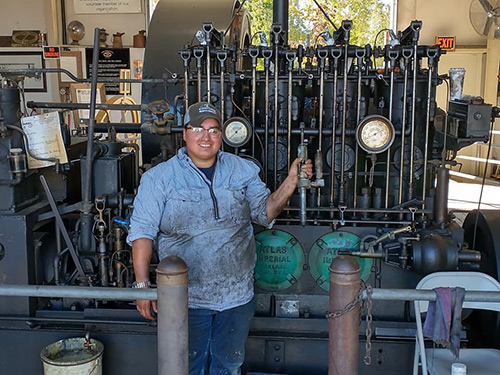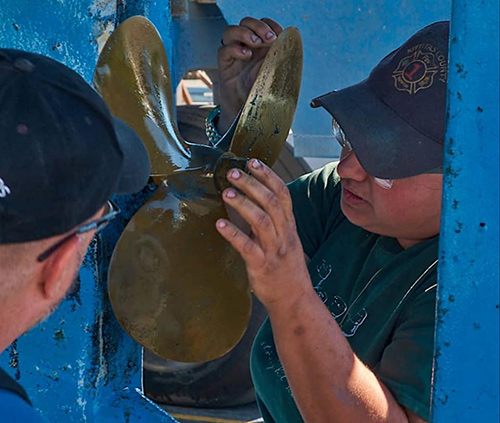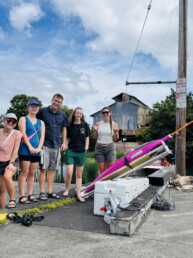Throughout my career, I have been asked many questions about what I do and why, or for tips and tricks to keep customers’ engines happy and healthy. Here are some of the most common questions I get and how I typically respond.

How long is a diesel engine supposed to last in a boat?
This question can have several answers. Of course, good maintenance and repair will make an engine last a long time. I often hear, “Oh, a diesel will easily reach 10,000-plus hours.” But that is rare. Diesel engines are quite capable of reaching 10,000 hours or more — however, the life they live aboard a recreational vessel is a tough one, making it hard to achieve that limit.
Remember, a diesel engine’s happy place is 80% to 100% under load, yet many owners want to save on fuel or tend to baby their engines by rarely revving them up high enough. Many engines aren’t started often enough and when they are, they’re idled excessively to maneuver out of the marina and immediately shut down for sailing or run at slower speeds while cruising. For those of us in the Pacific Northwest, where the wind can be iffy in summer, we motor our way up north for a few weeks and our engines are much happier, since they are being operated hard under load for hours of cruising time.
For boaters whose engines suffer due to excessive idling and low-speed conditions, poor maintenance, and shoddy repairs, the average hours for a tired sailboat or even powerboat engine are closer to 4,000 to 5,000 hours if the engine is well-maintained. More common with the engines I see is closer to 2,000 to 3,000 hours before they need a serious overhaul. Don’t be afraid to run your engine hard. It will appreciate it!
Should I repower or rebuild?
That question also has numerous answers, depending on the situation. If the engine is no longer supported by the manufacturer, parts are difficult to find, or the damage is such that a rebuild could be very expensive (for example, a cracked engine block in which cold stitching may be needed), a rebuild could easily exceed the cost of a new engine.
Some engines are very forgiving when it comes time for an overhaul. Universal’s diesel engines, which are built by Kubota and have removable cylinder liners, are a good example. It is still relatively easy and affordable to find complete rebuild kits with new pistons, rings, bearings, and liners, and the machining work required is usually simple, making a rebuild feasible.
There are also engines that were designed to be somewhat disposable (such as raw water-cooled engines). These engines were a cheaper alternative to their freshwater-cooled counterparts, are no longer supported by manufacturers, and even if they can be rebuilt with new parts, the block and cooling passages inside the block are often too badly damaged from seawater to be repaired to like-new condition.
Before having a professional rebuild an engine, it’s important to consider the various costs involved — for sourcing parts, the parts themselves, any machining required, and the labor for disassembling and reassembling the engine. A good mechanic or shop can help you determine whether a rebuild will save time and money and be worth it in the end.
If I’m not going to use my boat for long periods, like over the winter, should I leave the diesel tanks full? Should I or someone I’ve hired start and run the engine every week, two weeks, month?
If you are planning to be away from your boat for long periods of time, I would highly advise having a friend or hired professional come to the vessel to start and run the engine under load for a minimum of 30 minutes at least once a month. Get the engine(s) up to temp, shift them into forward and reverse and run them hard (don’t idle them!) and they will thank you by the time cruising season rolls around again. An engine that sits is an engine that dies.
Keeping fuel tanks full is always a good idea to avoid issues with condensation. Don’t forget, we all use low-sulfur fuel, which has an affinity for water. It is also a good idea to treat fuel with a biocide to prevent microbial growth throughout the year at every fill-up. For more information about fuel treatments and preventative maintenance for fuel systems, check out my article on diesel fuel systems (see 48° North April 2022).
What is the strangest/funniest thing you have found on a job?
The strangest and funniest thing I’ve encountered while working on a vessel was during a diagnostic call onboard a sailboat in Seattle. The client called me for a second opinion on why his engine would not start after another marine diesel company had looked at it. He mentioned that the engine was running until he heard a large bang and the engine just stopped — and would not start or turn over again. The first mechanic was sure it was a blown head gasket.
I opened up the hatch to the engine bay and found a piece of cast iron lying (rather obviously) in the bilge. As I looked further, I immediately found a gaping hole in the side of the engine block where a connecting rod had been thrown. “I don’t think your head gasket is blown. I think you need a new engine,” I told him.
What is the worst thing you have seen?
The worst thing I have ever seen onboard a boat was water pouring in from a stern tube flange on a large wooden boat. When I went to take a closer look, I realized the area of wood was completely rotted around the stern tube and if I pushed hard enough, I could create a hole. The boat was hauled out shortly after that and the problem was fixed right away.
How do you decide what to charge as an hourly rate?
A mechanic’s hourly rate isn’t their take-home pay. The cost to run my business is quite expensive in the state of Washington. Aside from my schooling to be a marine engineer, I have had to invest in thousands of dollars worth of tools more than once (thanks to thieves), keep my business licenses and permits active, pay for business insurance and business vehicle insurance, maintain and operate my service vehicles, pay waste disposal fees and rising fuel costs, rent a shop to rebuild engines, and much more. So I adjust my rates to reflect my overhead and expenses.
How do you get into this field? What education and experience do you need to get started?
I started my career as a marine engineer and eventually transitioned into self-employment. To begin my commercial career on the ocean, I attended Massachusetts Maritime Academy, where I gained the sea time and U.S. Coast Guard licenses to work as a professional merchant mariner. The recreational world doesn’t have quite the same resources. There are community colleges and small schools that will teach marine trades. Many folks go through ABYC (American Boat & Yacht Council) classes to get started.
While the commercial industry requires a lot of experience to even get hired, the recreational industry has almost no requirements. Getting hired at a local boatyard or as an apprentice under a marine tradesman will help to gain experience to become indispensable. Local schools teach specialty courses in boatbuilding, engines, electrical, and more for a certification to get started.
Are there resources for DIYers like me to learn about diesel engine maintenance or repair?
Yes! There are many different opportunities for learning more about the diesel engine on your boat. Seattle Maritime Academy in Ballard and Cruisers College in Anacortes offer recreational diesel courses. There are independent instructors like me who teach diesel concepts and hands-on skills with live training engines to individuals and groups such as yacht clubs. The Seattle Boat Show is another good resource for diesel classes.
Most of these classes are held over the weekend and provide a good foundation for understanding what is going on in your engine compartment. Many of us also branch out in a variety of ways to teach these concepts for those who can’t come to a class.

What do you do if you can’t figure something out?
No mechanic has all the answers … and that’s OK! For jobs I’m stumped by, I can call for another professional’s consultation to help me diagnose the issue. Many of my friends are mechanics, surveyors, marine engineers, or marine electrical engineers who can talk me through a problem if I am truly at a loss about what to do.
Working as a self-employed marine mechanic has opened many doors for me, and the experience of getting to work with so many amazing clients has been a blast. Getting to know who is working on your boat is always a smart idea. I hope answering these common questions has helped, and I look forward to seeing you on the water!






